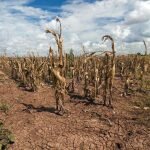Nigeria is one of the countries with the highest rates of deforestation in the world, having lost about 410,100 hectares per year between 2005 to 2010. Agriculture, logging, and mining have been identified as the main drivers of deforestation in the country.
As deforestation continues to worsen the effects of climate change, you might wonder if there’s any connection between the two. But it makes sense when you consider that living trees take in and store carbon dioxide; as such, when are felled, they release even more carbon into the air.
One report estimated that logging, clear-cutting, fires, and other forms of forest degradation contribute up to 20% of global carbon emissions.
Recognizing the urgency, the Federal Government has launched Nigeria’s National Reducing Emission from Deforestation and Forest Degradation (REDD+) Strategy document that would address the challenges of deforestation and forest degradation.
The development of the REDD+ Strategy document was set up with the support of the UN-REDD Program, the Forest Carbon Partnership Facility of the World Bank, under the technical guidance of the United Nations Development (UNDP), the Food and Agriculture Organisation of the United Nations (FAO) and the United Nations Environment Program (UNEP).
Commenting at the launch of the strategy document in Abuja, Dr. Mohammad Abubakar, the Minister of Environment, said the initiative was a strong indication of the commitment and effort of the Nigerian government in reducing the rate of deforestation and forest degradation in line with the objective of the Paris agreement in tackling climate change.
“The importance of a National REDD+ Strategy hinges on the premise that it stands tall as one of the pillars of REDD+ Readiness components for those seeking results-based payment for REDD+.
The strategy identified drivers of deforestation and forest degradation, analyzed existing (measures) and proposed policies and measures, with commensurate options for addressing the drivers of deforestation and forest degradation.
It also integrates various systems to establish baselines, monitor and report performance, and enables validation of claims of emissions reduction attributed to the REDD+ programs or activities within the country”, he said.
According to him, Nigeria’s vision for implementing REDD+ is to establish a climate-resilient economy driven by sustainable management of forests to enhance carbon sinks and reduce greenhouse gas (GHG) emissions by at least 20% by 2050.
He acknowledged the significance of the forest and land sector as a contributor to Nigeria’s greenhouse gas emissions, pointing out the need for international support to help develop and implement nature-based solutions identified in the strategy.
Nigeria would implement its REDD+ Strategy in phases over a thirty-year period from 2021 to 2050 to achieve the short, medium, and long-term goals. It is hoped that through strategy and program, the total forest sector emissions will reduce by 20%, approximately 150 MtCO2e over the next decade.
Abubakar also noted that Nigeria’s National REDD+ Strategy has identified four broad options that would enable the country to achieve the objectives of this strategy: address causes of deforestation; improve forest and climate change governance; enable equitable access to benefit and grievance redress; as well as attract incentives.
Like Gabon, Nigeria is no doubt positioning itself to attract incentives for curbing deforestation. Gabon is the first African country to receive results-based payments for curbing deforestation under the Central African Forest Initiative (Cafi).
In June, the country was awarded $17 million from Norway through Cafi for reducing emissions from deforestation and land degradation over ten years.





![MIT opens Solv[ED] Youth Innovation Challenge for young people ($200,000) Solv[ED] Youth Innovation Challenge - cleanbuild](/wp-content/uploads/2021/09/SolvED-Youth-Innovation-Challenge-150x150.jpg)












![MIT opens Solv[ED] Youth Innovation Challenge for young people ($200,000) Solv[ED] Youth Innovation Challenge - cleanbuild](/wp-content/uploads/2021/09/SolvED-Youth-Innovation-Challenge-74x55.jpg)

